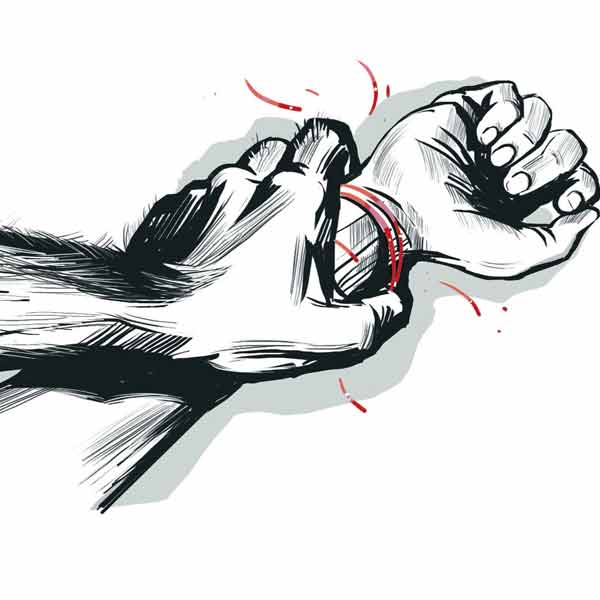By Dana Halawi BEIRUT (Thomson Reuters Foundation)

When Lina met her husband she was drawn by his warmth and quiet nature. At 19 she was keen to settle down and start a family, but she never imagined the nightmare ahead. "Marriage turned my life into a real mess," she says after 17 years of misery with a husband who she says repeatedly beat her up, abused her and left her in fear of her life. "
He used to invite his girlfriends over to our place without caring at all about my feelings," she added. "If I complained about his behavior he’d ask me to leave the house or even threaten to kill me." On one occasion she says her husband also beat their 10-year-old son up when he stepped in to protect her. Lina, a 36-year-old mother of three, is one of a handful of women in Lebanon who has dared to speak out about an issue that is strongly taboo throughout the Middle East.
This month campaigners released a powerful film on domestic violence which aired on national TV in the first such broadcast of its kind in Lebanon. The film, "Bil Anoun" (By Law), is based on the true story of a woman who used a new Lebanese law on domestic violence to protect herself and her child from her violent husband. The long-awaited legislation was passed last April, establishing for the first time important protection measures. But campaigners against domestic violence were outraged by amendments to the original draft law which had been pending in parliament since 2010. In particular, a key clause criminalizing marital rape was removed after it sparked a backlash from religious figures.
The title of the law was also changed to refer to violence against the family, as opposed to violence against women specifically. Lebanon’s 15 religious courts, which rule over marriage, inheritance and custody disputes, attacked the draft law as a bid to undermine their authority and westernize the Arab family. Many prominent religious figures spoke out against the proposal to criminalize marital rape, saying sexual intercourse was a husband’s right.
CHILD CUSTODY LAWS
Lebanon does not have data on the prevalence of domestic abuse, but campaign group KAFA, which drafted the original bill, said marital violence was rife. KAFA — which means Enough in Arabic — said its domestic abuse hotline received around 2,700 calls a year, but the number jumped last year following awareness campaigns. However, KAFA spokeswoman Maya Ammar said many conservative families still consider it deeply shameful if their daughters speak out about marital violence. "Our society burdens women with the belief that she is the first to be responsible for holding her family together.
So if she speaks out when facing violence or sexual abuse, they blame her for breaking the family apart," Ammar added. In many Middle Eastern countries women often prefer not to divorce because the law generally gives custody of children to the father. This forces women to stay in abusive marriages so they can remain with their children. Lina kept quiet for years to avoid stigmatization and for fear of losing her children. When she complained to her family they blamed her for not being patient with her husband. Last year she took the painful decision to walk out. Her older son visits her but she has no access to her younger children. "I only decided to divorce when I felt that the situation was getting worse and my life was being threatened," Lina said.
MARITAL RAPE
There has been outcry over a number of recent high profile cases in Lebanon where women have been killed by their husbands. Last year Rouqaya Mounzer, a 24-year-old woman, was allegedly shot in the chest by her husband in Beirut. She was pregnant with their third child. Another woman was bludgeoned to death with a pressure cooker and a third died from apparent insecticide poisoning. Ammar said around 12 killings were reported in the media every year, but that the real number was much higher. Campaigners hope the new law will help protect women from such violence but say it does not go far enough.
MPs from opposing political parties have also voiced strong reservations about the way the original draft was watered down and said they were given no chance to discuss the amendments. Elie Kayrouz, an MP from the Lebanese Forces party, said it was important to have a special law for protecting women because they were more often subjected to physical abuse. "We should also criminalize the act of marital rape just like the law now criminalizes beating, harm or verbal threats," he told Thomson Reuters Foundation. Campaigners are still determined to get marital rape put back in the domestic violence law, but this is unlikely to happen soon as the country is locked in a political stalemate which means parliament cannot pass legislation. However, Kayrouz said there would be a new push to criminalize marital rape when legislative sessions resume. (Reporting by Dana Halawi, Editing by Emma Batha)



